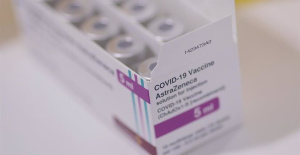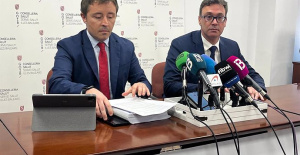Increases to 978 the reductions in sentences and to 104 the releases computed until March 31
MADRID, 14 Abr. (EUROPA PRESS) -
The General Council of the Judiciary (CGPJ) has indicated this Friday that 32% of the sentences reviewed in application of the so-called 'law of only yes is yes' has led to reductions under the rule that came into force on 7 October, according to data collected up to March 31 by the Supreme Court, the National Court, the Superior Courts of Justice (TSJ) and the provincial courts.
This has been reported by the governing body of the judges when updating its official count of revisions, reductions and releases carried out as a result of the Organic Law of Comprehensive Guarantee of Sexual Freedom. According to the data provided, there are already 978 sentence reductions and 104 releases, which adds up to 35 new reductions and a new release compared to the data that Council sources advanced to Europa Press last Wednesday.
In the breakdown of the data collected, it appears that the Supreme Court has applied 15 sentence reductions, while the National Court has issued one. The provincial courts, for their part, have agreed to 880 downward modifications and the TSJ have signed 82 reductions.
Thus, 40.5% of the Supreme Court reviews have involved a sentence reduction, according to information provided by the governing body of judges. In the National Court the percentage of reductions has been 14.3%.
Regarding the TSJ the percentage has reached 39.5% and in the provincial hearings 31.6%. Thus, in total sentences have been modified downward in 32% of cases, according to the figure handled by the CGPJ.
Regarding sentence reviews, it is clear that the provincial hearings have carried out 1,967; the TSJ, 86; the Supreme, 37; and the National Court 7.
When reviewing the data by provincial hearings, in Madrid there have been 362 reviews in Madrid, 118 reductions and 16 releases. There are 47 reductions more than the reductions registered in the first count of the CGPJ and 8 more releases.
The list of reductions also includes Alicante with 53 sentence reductions; Cádiz with 48; Valencia and the Balearic Islands with 46; Vizcaya with 42 and Barcelona with 40.
In the Superior Courts of Justice, the Community of Madrid also stands out with 26 downward modifications. They are followed by Andalusia and the Balearic Islands with 6; Galicia with 5; Aragon, Asturias, Castilla-La Mancha, the Valencian Community, Murcia, Navarra and the Basque Country with 4.
In line, the Council has also presented a breakdown of the release data: 99 in the provincial hearings and 5 in the TSJ. None have been registered either in the Supreme Court or in the National Court.
In addition to the 16 releases agreed by the Madrid Court, there are 8 in Cádiz; and 6 in Vizcaya, Barcelona and the Balearic Islands, as the provinces in which the most prison releases have been issued.
From the CGPJ they have stressed that the data that appear in the table of provincial hearings correspond "exclusively" to sentence reviews and "do not include those instance sentences handed down in relation to events that occurred before the entry into force" of the law in which has been applied -and not the norm in force on the date of the facts prosecuted- because it is considered more favorable for the accused. In line, he has indicated that the data relating to the Supreme Court correspond to resolutions issued in appeals.
In addition, it has explained that in order to obtain the total data, it has deduced the revisions of the sentence that the provincial courts had communicated, when these have been dismissed by the Supreme Court on appeal; likewise, he has added those revisions that, initially denied by the provincial courts, have finally been estimated by the Supreme Court on appeal.
As the Council has specified, the data offered "does not include the revisions of the sentence that the Criminal Courts, competent to prosecute crimes against sexual freedom, punishable by up to five years in prison, may have processed, given the difficulty of collecting this information from single-member bodies".
This Friday is the first official update carried out by the CGPJ since last March 2 it reported that there were 721 reductions and 74 releases throughout Spain as of March 1 due to the revisions carried out by the Organic Law of Integral Guarantee of Sexual Freedom.
On that occasion, the Council warned that it had not been able to collect data from all judicial bodies, so it lacked a "global" figure. In any case, he reported that his Permanent Commission had agreed in their conclave that the information would be "periodically updated and made public."
On the sidelines, it is expected that the Criminal Chamber of the Supreme Court will hold a monographic plenary session between June 6 and 7 to set criteria on the reviews carried out by the sentencing courts due to the criminal reform.
It will be the first time that the high court enters to analyze whether the courts have properly applied the Organic Law of Comprehensive Guarantee of Sexual Freedom in their sentence reviews. The magistrates will carry out this study with the objective of not only unifying criteria but also establishing doctrine, and because it already accumulates more than 20 appeals against review orders.

 Exploring Cardano: Inner Workings and Advantages of this Cryptocurrency
Exploring Cardano: Inner Workings and Advantages of this Cryptocurrency Seville.- Economy.- Innova.- STSA inaugurates its new painting and sealing hangar in San Pablo, for 18 million
Seville.- Economy.- Innova.- STSA inaugurates its new painting and sealing hangar in San Pablo, for 18 million Innova.- More than 300 volunteers join the Andalucía Compromiso Digital network in one month to facilitate access to ICT
Innova.- More than 300 volunteers join the Andalucía Compromiso Digital network in one month to facilitate access to ICT Innova.-AMP.- Ayesa acquires 51% of Sadiel, which will create new technological engineering products and expand markets
Innova.-AMP.- Ayesa acquires 51% of Sadiel, which will create new technological engineering products and expand markets AstraZeneca admits that its Covid vaccine can cause side effects such as thrombosis in "very rare cases"
AstraZeneca admits that its Covid vaccine can cause side effects such as thrombosis in "very rare cases" The PP signs the director of the cabinet of the governor of the Bank of Spain for its list for the European elections
The PP signs the director of the cabinet of the governor of the Bank of Spain for its list for the European elections Illa does not rule out agreeing with Junts after the Catalans if they do not prioritize independence
Illa does not rule out agreeing with Junts after the Catalans if they do not prioritize independence Los Angeles Police begin to dismantle the encampment at the University of California
Los Angeles Police begin to dismantle the encampment at the University of California How Blockchain in being used to shape the future
How Blockchain in being used to shape the future Not just BTC and ETH: Here Are Some More Interesting Coins Worth Focusing on
Not just BTC and ETH: Here Are Some More Interesting Coins Worth Focusing on UPV students design an app that helps improve the ventilation of homes in the face of high temperatures
UPV students design an app that helps improve the ventilation of homes in the face of high temperatures Ivace and promotes a less invasive device for the early detection of prostate cancer
Ivace and promotes a less invasive device for the early detection of prostate cancer Valencia unanimously approves the ordinance to allocate spaces to test innovative initiatives
Valencia unanimously approves the ordinance to allocate spaces to test innovative initiatives UPV researchers promote a paid master's degree as a "talent factory" in integrated photonics
UPV researchers promote a paid master's degree as a "talent factory" in integrated photonics A million people demonstrate in France against Macron's pension reform
A million people demonstrate in France against Macron's pension reform Russia launches several missiles against "critical infrastructure" in the city of Zaporizhia
Russia launches several missiles against "critical infrastructure" in the city of Zaporizhia A "procession" remembers the dead of the Calabria shipwreck as bodies continue to wash up on the shore
A "procession" remembers the dead of the Calabria shipwreck as bodies continue to wash up on the shore Prison sentences handed down for three prominent Hong Kong pro-democracy activists
Prison sentences handed down for three prominent Hong Kong pro-democracy activists ETH continues to leave trading platforms, Ethereum balance on exchanges lowest in 3 years
ETH continues to leave trading platforms, Ethereum balance on exchanges lowest in 3 years Investors invest $450 million in Consensys, Ethereum incubator now valued at $7 billion
Investors invest $450 million in Consensys, Ethereum incubator now valued at $7 billion Alchemy Integrates Ethereum L2 Product Starknet to Enhance Web3 Scalability at a Price 100x Lower Than L1 Fees
Alchemy Integrates Ethereum L2 Product Starknet to Enhance Web3 Scalability at a Price 100x Lower Than L1 Fees Mining Report: Bitcoin's Electricity Consumption Declines by 25% in Q1 2022
Mining Report: Bitcoin's Electricity Consumption Declines by 25% in Q1 2022 Oil-to-Bitcoin Mining Firm Crusoe Energy Systems Raised $505 Million
Oil-to-Bitcoin Mining Firm Crusoe Energy Systems Raised $505 Million Microbt reveals the latest Bitcoin mining rigs -- Machines produce up to 126 TH/s with custom 5nm chip design
Microbt reveals the latest Bitcoin mining rigs -- Machines produce up to 126 TH/s with custom 5nm chip design Bitcoin's Mining Difficulty Hits a Lifetime High, With More Than 90% of BTC Supply Issued
Bitcoin's Mining Difficulty Hits a Lifetime High, With More Than 90% of BTC Supply Issued The Biggest Movers are Near, EOS, and RUNE during Friday's Selloff
The Biggest Movers are Near, EOS, and RUNE during Friday's Selloff Global Markets Spooked by a Hawkish Fed and Covid, Stocks and Crypto Gain After Musk Buys Twitter
Global Markets Spooked by a Hawkish Fed and Covid, Stocks and Crypto Gain After Musk Buys Twitter Bitso to offset carbon emissions from the Trading Platform's ERC20, ETH, and BTC Transactions
Bitso to offset carbon emissions from the Trading Platform's ERC20, ETH, and BTC Transactions Draftkings Announces 2022 College Hoops NFT Selection for March Madness
Draftkings Announces 2022 College Hoops NFT Selection for March Madness























